originally posted at https://canmom.tumblr.com/post/163146...
Dinnertime! Gohda has a lot to say about food. A lot to say. Eva and Krauss of course try to one-up each other on knowledge about European cuisine. Everyone’s wondering where Beatrice is - except Krauss and Natsuhi, who aren’t aware she’s arrived. And the kids I guess?
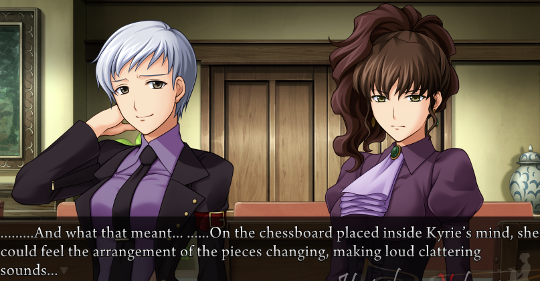

(She just figured out Krauss and Natsuhi had no idea about Beatrice.)
Well, this time we can be sure there’s no interminable argument over whether or not there’s a 19th person. That will be helpful.
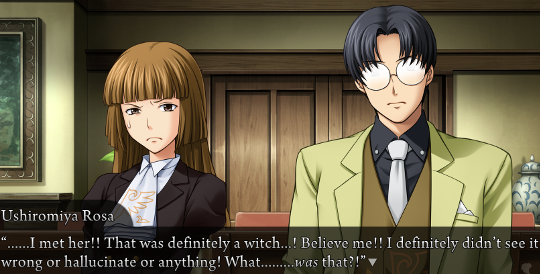
Rosa echoes Battler’s narratively-external doubts, insisting she didn’t hallucinate. Kyrie also says she saw a woman, though she doesn’t have confirmation it was Beatrice.
Good! Sharing knowledge! And nobody is dead yet! That’s already a better start than last time.
This time it’s Natsuhi as the only doubter. Eva and Battler point out nobody can prove prove there was no second boat. (Rosa doesn’t mention Maria’s claim that Beatrice lives on the island.)
They soon conclude Kinzo must have summoned her. And assume it’s over, what else, the inheritance.
This being the Ushiromiya family, they naturally end up accusing and shouting at each other instead of coming together to work out what’s what.
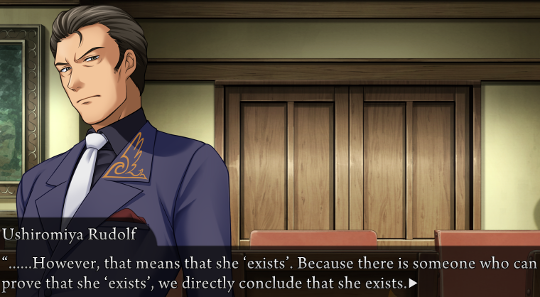
Here “‘existence’” and “existence” are distinguished. I’m wondering if there’s some difficult-to-translate semantic marker in Japanese that could be relevant here?
Rosa still hasn’t mentioned the letter.
Anyway, the cousins are sent back to the guesthouse because the adult Ushiromiyas don’t want to be coming to blows about inheritance in front of them. In the middle of dinner. Honestly. They tell all the servants to stay away too.
In short, they’re setting themselves up as perfect murder bait.
With everyone else kicked out, the adult Ushiromiyas interrogate Genji about Beatrice. But the scene ends just before Genji can answer.
Instead, we have Kumasawa making mackerel jokes to the cousins. <3
They start questioning Maria. Kumasawa says Beatrice appears before ‘honest people with clean hearts’ to play pranks.
The kids discuss - in front of Maria - how they used to leave sweets for her to find and imagine it was Beatrice. They also burst the Santa bubble. The narrator takes on a first-person pronoun briefly, unclear for who, maybe Battler? Anyway, now they know there is a self-described Beatrice. The narration makes very sure we know that.
In any case, Nanjo comfirms that Kinzo had a mistress called Beatrice, though he never met her… because she’s dead. Nanjo’s not sure if they had a kid, but suspects Kinzo’s Beatrice obsession means no kids. All the same, it’s the best explanation they have for the ‘Beatrice’ here now, though George offers the alternative of an impersonator who caught wind of the situation.
There’s another possibility they don’t mention: Beatrice could have faked her own death. That said, she’d probably have aged since then.
Battler suggests she’s here for revenge on Kinzo for abandoning her as a child.
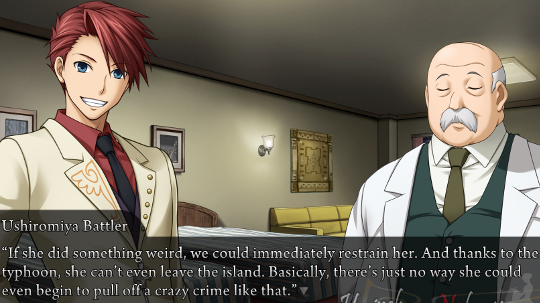
But he reasons she wouldn’t have a chance to pull that off.
It’s interesting that, if Beatrice has control of the narrative, she’s explicitly having the characters deny that she could pull off the murders she’s about to commit by mundane means. They repeat this point several times.
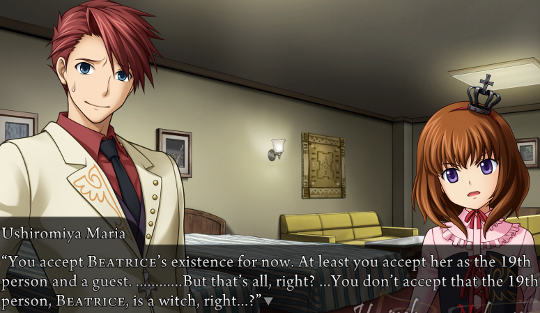
It now seems likely that when Maria laughs like this, and changes her manner of speech so drastically, she’s being possessed by Beatrice from outside the narrative?
The concept of the ‘Devil’s Proof’ has now come up several times, i.e. absence of evidence is not evidence of absence. Maria here accuses Battler of falling afoul of it.
This would be a place to appeal to parsimony? i.e. we can’t prove that witches don’t exist, but given that a model of all other phenomena that has no need for witches, it would be more surprising - require a bigger change to our beliefs - if witches exist than if someone was pretending to be a witch, so the weight of evidence needed to conclude that a witch is here is correspondingly higher.
The overall principle is Occam’s razor, the idea that the ‘simplest’ (most parsimonious) explanation - roughly the one that requires minimum assumptions - should be preferred, all else being equal. It would be possible to “explain” everything that happened with a cabal of witches controlling every twitch of every muscle, but that would require us to arbitrarily assume these witches’ actions, so it’s not parsimonious.
Assuming ‘magic exists’ is pretty big, so it’s not unreasonable to seek a more parsimonious explanation. One could also say the ‘magic exists’ hypothesis is very vague and has little predictive power.
Here’s an aside where I’m a total nerd and babble about statistics. Feel free to skip it.
It’s related to statistical hypothesis testing. If you do an experiment, you compare your results to a ‘null hypothesis’, usually that there’s no connection between the things you’re measuring. Inevitably, your results will differ at least slightly from your prediction.
In the traditional ‘significance testing’ approach, you calculate the probability that, assuming the null hypothesis is true and accounting for random errors, the discrepancy in your results would be at least as big as measured. If this probability is small enough, you declare the results ‘significant’. That doesn’t mean any particular alternative explanation is true, just that the observation is unlikely to be explained by the null hypothesis. You can also raise the question of ‘power’ - whether your experiment is likely to reject the null hypothesis if it is indeed false, which depends on how big your errors are.
Significance testing is hard, and distorted by the fact that sometimes a ‘significant’ result will appear by chance. With p=0.05 as the criterion, we’d expect 1 in 20 ‘significant’ results are mistaken, but this number becomes a lot bigger if we recognise that scientists often make statistical mistakes, only ‘significant’ results are likely to be published (the ‘file drawer effect’), and so on.
Also apparently nowadays methods with a specific alternative hypothesis are also commonly used, but I know less about this.
In any case, to stretch the terms a little, here we have a null hypothesis: a ‘mundane’ world with no witches, spirits etc. Maria/Beatrice’s task is to demonstrate first that the phenomena are very unlikely under the null hypothesis, and secondly that the ‘Beatrice is a witch’ hypothesis has better explanatory power than any other hypothesis.
All that said, framing like I am it in terms of probabilities and statistics is troublesome, because this is much more like a courtroom situation than a scientific experiment. It would be impossible to calculate a p-value given all the uncertainties involved, so this is more of a ‘reasonable doubt’ situation.
I think that’s what Battler tries to say, but he doesn’t really express that very well, saying he can’t prove it but he claims witches don’t exist because ‘stuff like that’ doesn’t exist. Maria calls him on a circular argument.
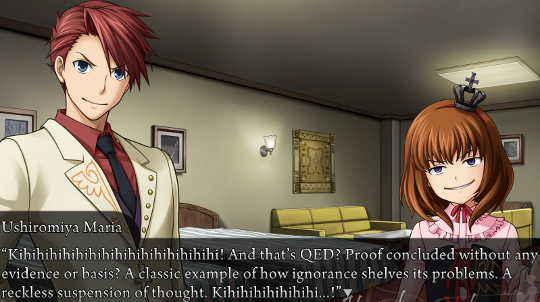
She sure doesn’t sound like a nine-year-old here.
Battler says, if that’s so, bring some proof of Beatrice and his claim will be defeated. Essentially, he’s asserting ‘no witches/magic’ is the default assumption, like the presumption of innocence, that must be overcome by the prosecution, Beatrice.
‘Show us something that’s impossible by humans’ says Battler. Disprove the null hypothesis.
Maria says, if Beatrice does this, Battler must believe in Beatrice. Not so fast - disproving the null hypothesis doesn’t prove an alternative hypothesis.
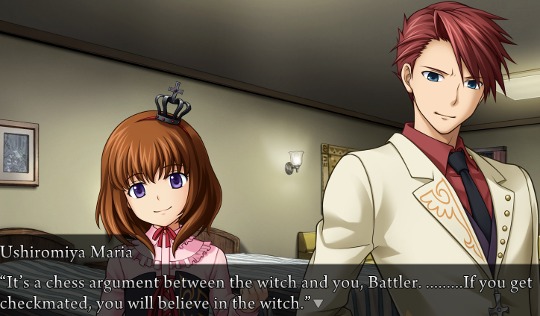
Maria makes the chess metaphor, apparently rather astutely recognising the meta-narrative situation.
She also tells Battler the ‘chessboard thinking’ won’t work against a non-human opponent.
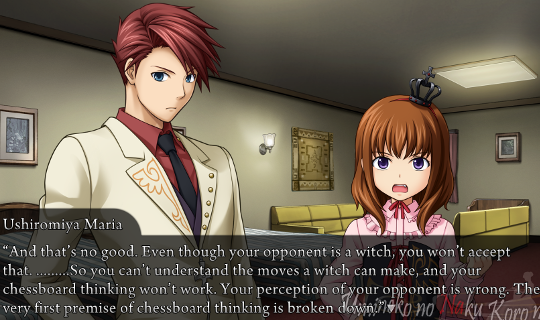
She uses the pronoun ‘sonata’ to refer to Battler. Wikipedia compares this pronoun to ‘thou’:
Originally a mesial deictic pronoun meaning “that side; that way; that direction”; used as a lightly respectful second person pronoun in previous eras, but now used when speaking to an inferior in a pompous and old-fashioned tone.
Next, a marriage proposal, most likely.
Comments